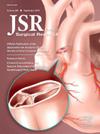急性肠系膜缺血患者的治疗和预后的种族和性别差异:一项全国回顾性队列分析
IF 1.8
3区 医学
Q2 SURGERY
引用次数: 0
摘要
导言急性肠系膜缺血(AMI)如果不及时干预,预后往往很差。尽管急性肠系膜缺血非常严重,但人们对住院患者的预后在性别和种族方面的差异知之甚少。本研究的目的是利用美国全国住院病人抽样调查(NIS)数据库,描述急性心肌梗死住院病人的性别和种族差异。方法利用 NIS 数据库对 2016 年 1 月 1 日至 2020 年 12 月 31 日期间主要诊断为急性心肌梗死的住院病人进行回顾性队列研究。研究人员比较了不同种族群体和性别的人口统计学特征、合并症和院内预后。分类变量和连续变量分别采用卡方检验和多变量线性回归进行分析。结果 在 99,225 名患者中,55,420 人(55.8%)为女性。与男性相比,女性的院内死亡率(OR 0.93,P = 0.04)、急性肾损伤(OR 0.70,P < 0.001)、使用血管加压器(OR 0.79,P < 0.001)、有创(OR 0.77,P <;0.001)和无创机械通气(OR 0.70,P <;0.001)、血液透析(OR 0.92,P <;0.001)、静脉血栓栓塞(OR 0.78,P <;0.与白人患者相比,西班牙裔患者的住院患者死亡几率明显较低(OR 0.87,P = 0.04),而美国本土患者的住院患者死亡风险较高(OR 1.64,P = 0.01)。非裔美国人患者接受经皮血管介入治疗的几率明显较低(OR 0.39,P = 0.001),接受小肠切除术的几率较高(OR 1.25,P = 0.001)。结论AMI在男性中的预后较差,根据患者的种族也可观察到差异,某些少数群体的并发症情况较差。本文章由计算机程序翻译,如有差异,请以英文原文为准。
Racial and Gender Disparities in the Management and Outcomes of Patients With Acute Mesenteric Ischemia: A Nationwide Retrospective Cohort Analysis
Introduction
Acute mesenteric ischemia (AMI) is often associated with poor prognosis without immediate intervention. Despite the severity of AMI, little is known regarding gender and race specific disparities in outcomes of hospitalized patients. The aim of this study was to characterize gender and race specific disparities in patients hospitalized with AMI using the U.S. National Inpatient Sample (NIS) database.
Methods
A retrospective cohort study was performed on patients admitted with a primary diagnosis of AMI between January 1, 2016, and December 31, 2020, using the NIS database. Demographics, comorbidities, and in-hospital outcomes were compared between racial groups and genders. Categorical and continuous variables were analyzed with chi-squared test and multivariable linear regression, respectively. Odds ratios (ORs) for the race and gender cohorts were obtained with logistic regression models.
Results
Of 99,225 patients, 55,420 (55.8%) were female. Compared to males, females had lower odds of in-hospital mortality (OR 0.93, P = 0.04), acute kidney injury (OR 0.70, P < 0.001), vasopressor use (OR 0.79, P < 0.001), invasive (OR 0.77, P < 0.001) and noninvasive mechanical ventilation (OR 0.70, P < 0.001), hemodialysis (OR 0.92, P < 0.001), venous thromboembolism (OR 0.78, P < 0.001), myocardial infarction (OR 0.80, P = 0.003), sudden cardiac arrest (OR 0.89, P = 0.002), and small bowel resection (OR 0.92, P = 0.003).
Relative to White patients, Hispanic patients had significantly lower odds of inpatient mortality (OR 0.87, P = 0.04) and Native American patients had a higher risk of inpatient mortality (OR 1.64, P = 0.01). African American patients were significantly less likely to undergo percutaneous vascular intervention (OR 0.39, P < 0.001) and more likely to undergo small bowel resection (OR 1.25, P < 0.001).
Conclusions
AMI has worse outcomes in males. Disparities were also observed based on the race of the patients, with a worse complication profile among certain minority groups.
求助全文
通过发布文献求助,成功后即可免费获取论文全文。
去求助
来源期刊
CiteScore
3.90
自引率
4.50%
发文量
627
审稿时长
138 days
期刊介绍:
The Journal of Surgical Research: Clinical and Laboratory Investigation publishes original articles concerned with clinical and laboratory investigations relevant to surgical practice and teaching. The journal emphasizes reports of clinical investigations or fundamental research bearing directly on surgical management that will be of general interest to a broad range of surgeons and surgical researchers. The articles presented need not have been the products of surgeons or of surgical laboratories.
The Journal of Surgical Research also features review articles and special articles relating to educational, research, or social issues of interest to the academic surgical community.

 求助内容:
求助内容: 应助结果提醒方式:
应助结果提醒方式:


